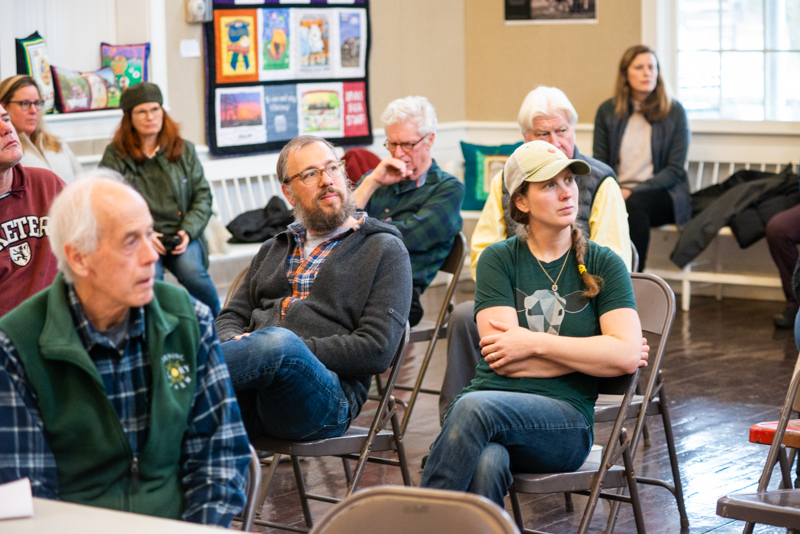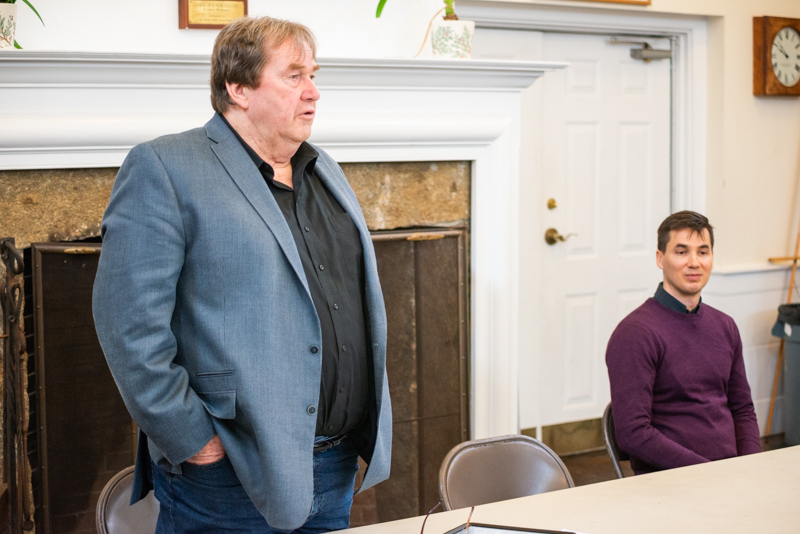Two topics dominated when the Martha’s Vineyard Farm Bureau recently hosted representatives from state government and the statewide farm bureau: housing and the possibility of building an animal processing facility on the Island.
State Rep. Dylan Fernandes, Massachusetts Farm Bureau Federation president Warren Shaw, and Michael Holcomb, district director for State Sen. Julian Cyr, attended Friday’s public meeting with local farmers.

A first for the Island, the farm bureau was founded in 2020 with a mission to support and advocate for Vineyard farmers. Dan Martino and Brian Athearn represent the Vineyard as state appointees. The farm bureau complements the activities of the Agricultural Society, an organization that farm bureau president Dan Martino described as “the strongest community glue that you can have.”
The bureau has the mandate to actively initiate and advocate for legislation affecting the agricultural sector.
Since its founding, the Island bureau has been involved with a bill that would remove aquaculture from The Merchant Marine Act of 1920 (commonly known as the Jones Act), a federal law aimed at protecting maritime workers from injuries at sea.
Before the meeting, Mr. Martino expressed the belief that insurance expenses associated with the Jones Act were cost prohibitive for small aquaculture businesses to the point of possibly causing bankruptcy. The bill is pending in the U.S. Congress.
The meeting was also a chance for Island farmers to meet face to face and discuss common concerns as they look to the upcoming growing season. Housing for seasonal workers was one issue. Complaints were raised about the restrictions and requirements for dormitory-style housing and town zoning laws that restrict group housing.
Mr. Fernandes responded in sharp tones, criticizing the Island for lagging on the housing front.
“It’s astounding how little Martha’s Vineyard has done on the issue of housing. There’s no real coordination here,” he said. “You have the property tax base here to do something about housing. You have to till the fields on this. The Vineyard is going to very quickly become Nantucket.”
The long-discussed issue of an animal processing facility saw renewed discussion. Chickens are processed on Island, but Vineyard farmers currently take their meat off-Island to be processed. With small farms on the rise, many believe there is enough demand to support an Island facility. Julie Scott of Slough Farm noted that the closest facility to the Island is Meatworks in Westport, on the border of Massachusetts and Rhode Island. Ms. Scott said Meatworks is raising its prices.
Mr. Shaw added that off-Island slaughterhouses already have more business than they can handle.
Grey Barn owner Eric Glasgow outlined potential obstacles, including quality control and attracting skilled butchers to the Island to work at the facility.
The problems of labor shortages and H2B visa restrictions were also discussed. Mr. Fernandes said the federal H-2B program that has been scaled back; he urged farmers to contact their federal representatives.
Other issues raised included zoning exemptions needed to support agro-tourism and Canada geese infestation.
Mr. Shaw assured all assembled that the statewide farm bureau would help with many of the issues, but he said actions on housing would be needed at the county level.
A general message from all the presenters, and backed by Agricultural Society executive director Lauren Lynch, was that contacting state and federal officials through letter writing campaigns would be a solid grassroots action for Islanders to undertake.









Comments
Comment policy »